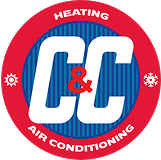The cost of running a heating system can account for up to 50% of your household’s energy bill. That’s why it’s crucial to determine energy efficiency when shopping for a furnace. But what does it mean for a furnace to be energy efficient? Before you determine the effectiveness of an electric heating system, there are a few things you need to know.
Understanding Energy Efficiency Ratings
Energy efficiency is defined as the amount of fuel the equipment consumes compared to its heat output. An electric furnace can convert virtually 100% of the electrical power it consumes. There are rating systems used to determine the efficiency of various types of furnaces.
According to AFUE (Average Fuel Utilization Efficiency), a gas furnace typically converts 80% of its fuel to heat. Older models are even less efficient, often with an output of approximately 70%. There are modern furnaces whose efficiency ratings may exceed 90%.
Another rating system is SEER, which is a ratio of energy to the equipment’s cooling output in a given period. Because it measures cooling, it measures the efficiency of air conditioners. But SEER can also rate heat pumps since they may also cool the interior during the warm season.
The HSPF (Heating Seasonal Performance Factor) is specifically for rating the efficiency of heat pumps. As with AFUE and SEER, the higher the rating, the more effective it’ll be at converting electrical energy to heat.
Efficiency is a critical factor for areas with freezing winter weather like Missouri. When rating heat pumps and air conditioning systems, the Department of Energy considers regional and climatic factors. A system with a high level of efficiency may not be the best option if your household’s consumption is low.
Are Electric Furnaces More Efficient?
But does that mean that electric furnaces are cheaper to run? The fact that electrical heating systems can convert 100% of their energy doesn’t necessarily mean they’re cheaper to operate. Electricity is usually more expensive than other sources of fuel, such as natural gas.
Gas systems lose most of their energy from heating and through the exhaust. If you have a natural gas connection to your home, they’re the best option if you want to save on your utility bills. However, there are other factors to consider when evaluating the expenditure of your home’s heating system.
Cost of Fuel and Heat Generation
Electric furnaces employ resistive heating, which involves passing a current through a conductor. Most electric heating equipment will need several of these heating elements to avoid overloading the house circuit. As a result, it uses up a considerable amount of power to raise the room temperature.
A better option for your home in Missouri would be a heat pump. They can capture heat from the outdoors and distribute it throughout the building. They use a refrigerant, which can reverse the process when you need to cool the interior in summer.
According to the Department of Energy, the lowest SEER rating for a heat pump is 14. More recent systems have a rating of up to 20. With about 110 days of freezing temperatures, you should install the most efficient furnace in your Missouri home.
Another situation that may call for the use of a heat pump is when you have a new addition. It would be an ideal choice for a mother-in-law suite or an extra room in your house. In such circumstances, it is a more practical option than extending your central heating system.
You can talk to C & C Heating and Air Conditioning if you’re looking for a suitable heat pump for your home in Macomb Township. We install and service Trane and Carrier equipment, but our experienced technicians can service all makes.
Operation and Maintenance Considerations
Efficiency is one of the factors that will impact costs, but you should also consider durability and maintenance. You can expect an electric furnace to last between 20 and 30 years. On the other hand, gas furnaces have a lifespan of about 10 to 15 years.
Electric heating systems last longer because they don’t have multiple components that require regular maintenance. They usually have no moving parts, and some may not need a fan to deliver warm air into your home.
Gas furnaces will need tune-ups of the ignition, burner, and heat exchanger to keep them efficient and safe. These heating systems work through the combustion of gas, which requires monitoring to prevent hazards. When you overlook routine maintenance, your system will have to overwork to heat the building. For some, the cost and time investments in gas systems may make using gas an unattractive option.
Also, electric systems don’t require storage tanks, like propane and oil heaters. These storage tanks can be expensive to maintain. In places where there is no access to gas lines, the most affordable option is an electric furnace.
Safety and Comfort
An electric furnace generally has a less noisy operation owing to its smaller and fewer components. They are also safer than their natural gas, propane, and oil counterparts. They’re an ideal option if you’re looking for optimal comfort.
Gas furnaces can produce significant amounts of carbon dioxide. An efficient heating system will have mechanisms to detect the hazards. You need to ensure the smoke and carbon monoxide detectors are working.
CO poisoning is known to cause serious health issues and even death. [Company_name] recommends inspecting your heating equipment before the season starts in Macomb Township. You need to ensure your safety system is working so you’ll know when there’s a hazard.
For some people, the possibility of such hazards happening can be scary. The risk of carbon monoxide poisoning is low when you observe regular maintenance. However, you may decide to install an electric system if only for your peace of mind.
Control Systems and Efficiency
All electrical systems usually have a control system in the form of a thermostat to optimize energy efficiency. The most recent versions of these devices can be programmed to make temperature regulation more accurate.
You can integrate the device with a smart system for maximum energy efficiency, convenience, and comfort. You can even instruct your system to warm your home while on your way home from work. It can also detect occupants and turn down the system when no one’s home.
Combined with other features such as status reports, you can better manage your power consumption to reduce your utility bills. Zoning will make smart systems more efficient than using a thermostat on its own.
Smart zoning systems will have a motorized damper to optimize the delivery of warm air to every room. That means they don’t have to work as hard to regulate temperature compared to conventional systems. Not only can it reduce utility bills by 30%, but zoning can also extend the life of your furnace.
But keep in mind that many factors will determine the most efficient furnace to install. Luckily, our professionals can analyze your home and recommend a suitable heating system to enhance heating efficiency.
Kindly call C & C Heating and Air Conditioning in Macomb County and enjoy a whole range of heating and cooling solutions for your home. You can also count on use for indoor air quality and duct cleaning services. We take pride in our 100% customer satisfaction guarantee.





